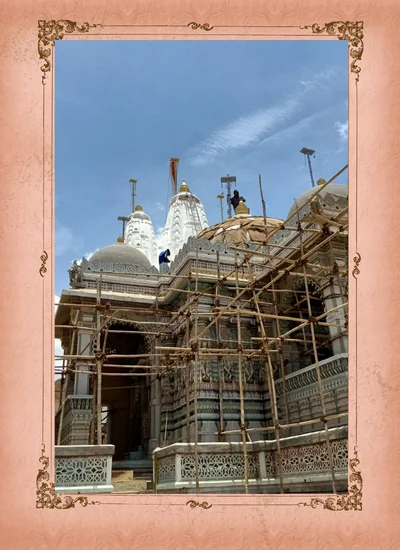The state of Rajasthan is celebrated for its architectural marvels, particularly its traditional temples that stand as symbols of religious devotion and cultural heritage. These temples, adorned with intricate carvings, unique structural designs, and deep spiritual significance, have been constructed by skilled local artisans for centuries. As modern construction techniques evolve, the role of local artisans in preserving traditional temple architecture remains essential. This article explores how these artisans integrate their ancient skills into contemporary temple projects, ensuring the longevity of this sacred art form. We will also discuss the importance of a proficient Temple Contractor in Rajasthan in maintaining this balance.
Role of Local Artisans in Modern Temple Construction
Preservation of Traditional Craftsmanship
Local artisans in Rajasthan possess knowledge of centuries-old techniques that have been passed down through generations. Whether it’s stone carving, woodwork, or metalwork, these craftsmen continue to use the same methods that have been employed in temple construction for centuries. In the face of modern development, their work plays a pivotal role in preserving the region’s traditional temple architecture.
A skilled Temple Construction Service in Rajasthan understands the value of these artisans and ensures their inclusion in contemporary temple projects. By working with these skilled craftsmen, modern temples can maintain their traditional aesthetic, while still benefiting from advancements in construction technologies.
Mastery in Stone and Wood Carving
Rajasthan’s temples are known for their elaborate stone and wood carvings, which often depict gods, goddesses, and scenes from Hindu mythology. These intricate carvings are integral to traditional temple architecture, and only skilled artisans can execute them with precision and authenticity.
Even in modern temple construction projects, local artisans use hand tools and techniques that have been refined over centuries. Their expertise in carving detailed pillars, sanctum walls, and temple facades ensures that the new temples are not only structurally sound but also artistically aligned with ancient traditions.
Choosing a Temple Contractor in Rajasthan who values the craftsmanship of local artisans guarantees that traditional elements like these are preserved and seamlessly incorporated into modern designs.
Challenges in Merging Traditional and Modern Techniques
Balancing Tradition with Modern Construction Technologies
One of the biggest challenges in modern temple construction is striking a balance between preserving traditional architectural elements and utilizing modern construction technologies for efficiency and durability. Traditional temple architecture often requires materials like stone, brick, and wood, along with manual labor for intricate detailing, while modern construction may involve prefabricated materials and advanced machinery.
A reliable Temple Construction Service in Rajasthan bridges this gap by incorporating modern techniques such as 3D modeling, which allows for precise planning and execution. By digitally designing the temple with exact dimensions and placements, contractors can ensure that traditional elements, such as orientation based on Vastu Shastra, remain intact.
Maintaining Sacred Elements in Modern Structures
Temples are sacred spaces that must adhere to specific architectural rules outlined in ancient texts like Vastu Shastra and Shilpa Shastra. However, modern construction often requires adjustments to ensure safety, structural integrity, and accessibility. Local artisans, in collaboration with a knowledgeable Temple Contractor in Rajasthan, are essential in ensuring that the temple’s sacred design elements—such as the sanctum sanctorum, gopuram (tower), and mandapas (pillared halls)—are preserved while meeting modern construction standards.
Artisans use traditional techniques to carve sacred symbols and design features that maintain the temple’s spiritual significance. Their role is particularly crucial in blending new construction methods with the sacred, spiritual geometry that forms the foundation of traditional temples.
Solutions for Preserving Traditional Architecture
Collaboration Between Contractors and Local Artisans
Successful temple construction projects in modern times require close collaboration between contractors and local artisans. The Temple Contractor in Rajasthan must respect the artisans’ craftsmanship and integrate their work into the broader construction framework.
For instance, while modern machinery may be used to lay the temple’s foundation or install modern utilities, the artisans’ work on carving deities, creating detailed frescoes, and designing sacred patterns ensures the temple retains its traditional character. This collaborative effort results in temples that not only meet contemporary standards but also reflect Rajasthan’s rich cultural heritage.
Use of Authentic, Locally Sourced Materials
To preserve the authenticity of traditional temple architecture, it is important to use locally sourced materials that have been used in Rajasthan for centuries. Stones such as Makrana marble and Dholpur sandstone have long been favored in temple construction for their durability and aesthetic qualities.
A competent Temple Construction Service in Rajasthan will ensure that these materials are sourced sustainably and incorporated into the temple’s construction. Local artisans, who have worked with these materials for generations, play an essential role in shaping them into the intricate designs required by traditional temple architecture.
Incorporating Traditional Design with Modern Needs
Modern temples often need to accommodate larger crowds, modern utilities, and other conveniences that ancient temples were not designed for. Local artisans and contractors work together to modify traditional designs without losing their essence. For example, modern construction may involve creating larger mandapas or using reinforced materials to accommodate increased foot traffic, while still maintaining the traditional carvings and layout that define Rajasthani temple architecture.
The role of a skilled Temple Contractor in Rajasthan is to ensure that these adaptations do not compromise the spiritual and cultural essence of the temple.
Conclusion
Local artisans play a critical role in preserving traditional temple architecture in modern construction projects in Rajasthan. Their deep understanding of age-old craftsmanship, combined with the expertise of a knowledgeable Temple Construction Service in Rajasthan, ensures that new temples continue to reflect the beauty and spiritual significance of Rajasthan’s rich cultural heritage. By integrating traditional methods with modern construction techniques, local artisans help create temples that stand as a testament to the enduring legacy of Rajasthani temple architecture.

